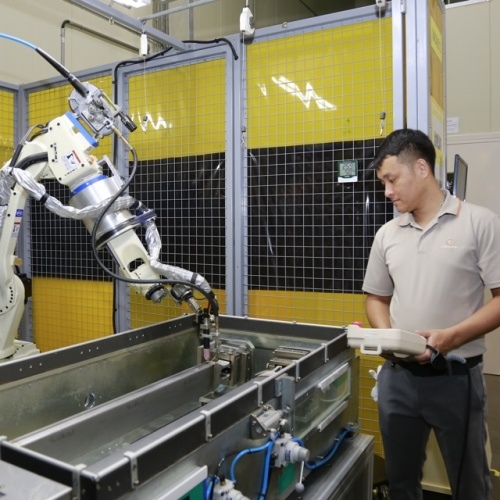Hanoi's businesses place focus on digital transformation
Hanoi's businesses place focus on digital transformation
Businesses need to utilize digital technologies to streamline operations, increase efficiency, and provide greater value to customers.
Many enterprises in Hanoi have allocated 45% of their budgets for digital transformation in response to the Covid-19 pandemic. However, local experts have highlighted that this funding is still not proving effective and falls short of meeting the actual demand for digital upgrades, according to a survey conducted by the Hanoi Small and Medium Enterprises Association.

Production line operated by South Korean firm Hanwha Aerospace at Hoa Lac Hi-Tech Park. Photo: Thanh Hai/The Hanoi Times |
The survey, presented at a recent seminar titled "Digital Transformation for Small and Medium Enterprises in Hanoi," revealed that while some businesses have successfully integrated digital technologies, many are still struggling to keep pace with the transformation.
Accounting has emerged as a leader in the adoption of digital tools, with over 40% of companies using advanced digital solutions in this area, said Trinh Thi Ngan, Chairwoman of the Advisory Board of the Hanoi Small and Medium Enterprises Association (HANOISME).
In contrast, Ngan added, the transportation and logistics sector has a very low level of technology adoption, with 64% of enterprises rarely or never using digital software. In addition, more than 40% of small and micro businesses report minimal or no use of digital tools to manage human resources, inventory, and customer relations.
The Advisory Board chairwoman pointed out that companies' digital transformations are fragmented.
"Many operate with disjointed capabilities and lack integration between software and processes, especially in inventory, customer, and human resource management," Ngan said.
"Financial constraints also pose significant challenges for SMEs in delivering effective digital transformation strategies," she said.
Hanoi-based SMEs have recognized the importance of digital transformation, but they have made little progress in this regard, often falling short of expectations, she said.
The association's survey found that about 20% of these businesses have no budget allocated for digital transformation. Meanwhile, 36% of businesses have adopted some digital solutions in the past but no longer use them, and 39% have digitized their data and processes.
To strengthen digital transformation efforts among SMEs, Hanoi aims to become one of the top five leading localities in digital transformation and e-government development by 2025.
The leader of the Advisory Board emphasized that the city is implementing plans to help startups and businesses digitalize their operations, ensuring that 100% of Hanoi's SMEs are aware of digital transformation by 2025.
Solutions for digital transformation challenges
In light of the challenges faced by SMEs in Hanoi during their digital transformation journey, local experts proposed various solutions and skills to support these businesses from 2021 to 2025. The goal is to change mindsets, operational methods, and business models to create new value for customers.

VinSmart factory in Hoa Lac Industrial Park. Photo: Vingroup |
To thrive in an increasingly complex business environment, companies must embrace and leverage digital technologies to streamline operations, increase efficiency, and deliver value to customers, said Le Tu Luc, Deputy Director of the Hanoi Promotion Agency.
Luc noted that Hanoi is financing some 100,000 SMEs in their digital transformation efforts.
This support covers the provision of training materials, consulting, access to digital platforms, and financial support for the purchase or leasing of digital solutions. The city is also encouraging the use of digital signatures and e-invoicing, which are essential steps to ensure sustainable growth and improve business performance in the digital age.
Chairwoman Ngan of the HANOISME Advisory Board said soft loans are an essential source of financing for SMEs undergoing digital transformation. In particular, the Government should provide interest-free or low-interest loan schemes to encourage investment in digital technology.
The financial burden on SMEs can also be alleviated through tax benefits, such as exemptions or rebates for activities related to digital transformation, she added.
Ngan recommended that the Hanoi People's Committee improve the institutional and legal environment, and issue policies that encourage digital initiatives.
The city authorities also need a plan for developing and putting information technology in use, while improving communication among subordinate agencies to ensure consistent investment in digital infrastructure.
Moreover, the city should give priority to training experts on digital transformation to help SMEs by creating an advisory network, offering customized training and advisory services, and developing supportive packages with instructional and technical solutions based on company size and industry.



























